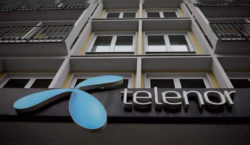
Following Telenor’s announcement at the beginning of July on the sale of it’s Myanmar business to M1 Group, the controversial company with reported ties to the Myanmar military, several human rights groups and organizations have urged the Norwegian telecom giant to stop the sale.
On 31 August, Norwegian daily Aftenposten published an op-ed by Jørgen C. Arentz Rostrup, EVP and Head of Telenor Asia in where he addresses Telenor sale of its Myanmar business and the Norwegian telecom giants commitments to human rights.
“It is important to remember that the human rights violations in Myanmar are due to the change of regime, not the sale of Telenor.”
Jørgen C. Arentz Rostrup writes:
Telenor entered Myanmar because we wanted to make a difference, with high business standards based on our values. For a country that had been closed to the outside world for more than 40 years, such an approach was an improvement in itself.
This, and our contribution to provide internet and smartphones, was welcomed by society and people all over the country. Since then, doing business according to our values and standards has been a prerequisite for us to be able to be present in Myanmar.
To set clear requirements to the way we do business have binding consequences. According to the UN, after the military takeover in February, there have been serious human rights violations, and the situation in the country is critical. Telenor has therefore repeatedly protested decisions by the military government in Myanmar, while at the same time doing our utmost to take care of the safety of our employees and continue to provide services to the people of Myanmar.
In the past months, it has become clear to us that it will not be possible to operate according to our values or international laws and standards in the way we were set to do in Myanmar – and there are no prospects of improvement. After considering all possible alternatives and events, we had no choice but to decide to sell. We understand the disappointment expressed by many concerning Telenor’s departure from Myanmar. It is, however, important to remember that the human rights violations in Myanmar are due to the change of regime, not the sale of Telenor.
Before we entered Myanmar, we made thorough assessments, including evaluations of the political situation and human rights. In 2014, Myanmar’s process of democratization had progressed quite far. This was an assessment not only made by us, but also by the international community. During this time, we have been open about the challenges we have faced. We have had close dialogues with a wide range of local and international civil society organizations both before and after we entered, including after the military takeover.
This summer, numerous civil society organizations sent a complaint to Norway’s OECD contact point for responsible business, with allegations that Telenor has not followed the OECD’s guidelines in the sale of Telenor Myanmar. Although we disagree with the criticism directed at Telenor, we share the concerns regarding the serious situation in Myanmar, and we are supporting the OECD contact point with facts and clarifications.
We are committed to complying with the OECD’s guidelines for multinational companies, as well as the UN’s guiding principles for business and human rights. This also corresponds well with our values and standards. These are the same values that are now the basis of the decision to leave Myanmar. It is also important to emphasize that we have made assessments related to human rights and privacy in a sale and conducted surveys of potential buyers.
Christina Pletten recently commented on Telenor and Myanmar in the Norwegian daily newspaper Aftenposten. Pletten’s comment seems to imply that it would have been better for Telenor to enter Myanmar with no aim of making a difference, because “the loss would have been just as great in terms of money, but the moral descent would have been considerably less”. This argument turns the matter upside down. For Telenor, it has never been any alternative to operating responsibly and contributing positively for the population. In our opinion, acting as a value-driven and responsible company is both ethically and financially correct. This has been especially important since the military takeover.
Furthermore, Pletten has her facts wrong when she casts doubts on whether our plan this winter was continued presence in Myanmar. In fact, we have constantly worked to find a solution to remain. At the same time, we have openly communicated dilemmas we increasingly were facing as the situation became more critical. Finally, we had no choice. The sale, which must be approved by local authorities, was the least detrimental solution for our employees, customers, and suppliers, who are not only suffering a humanitarian and human rights crisis but also a national economic disaster with few opportunities for improvement.
For Telenor, it is crucial to maintain our international obligations and act in accordance with human rights, no matter where we operate. We have faced tough choices, but we still believe that companies with good and responsible business operations driven by values, will be the ones succeeding in the years to come.






One Comment on “Op-ed by Head of Telenor Asia on the sale of Telenor’s Myanmar business”